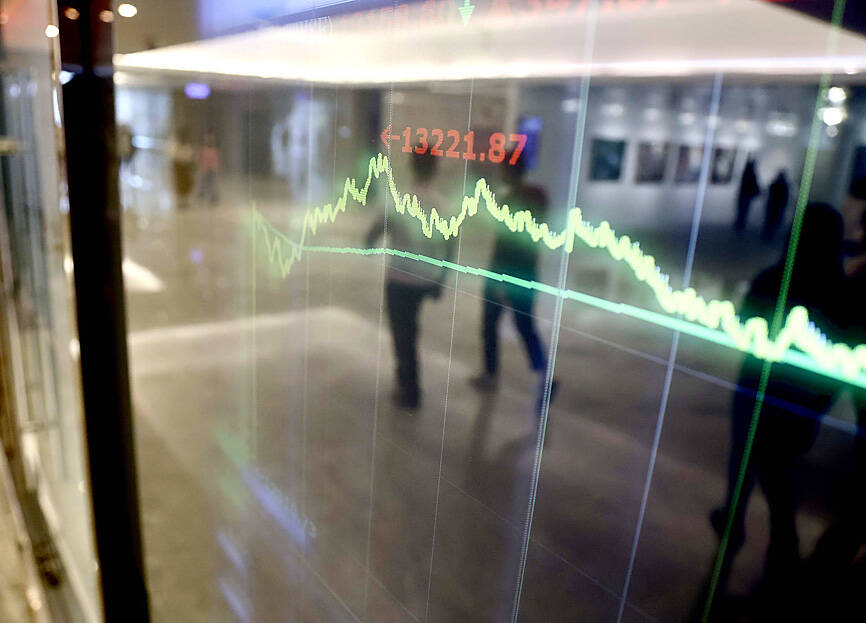Foreign institutional investors registered net fund inflows last month, reversing four consecutive months of net fund outflows, after the Financial Supervisory Commission introduced restrictions on short selling on the stock market at the beginning of the month.
Data compiled by the commission showed foreign institutional investors recorded US$456 million in net fund inflows last month after US$577 million in net fund outflows in September.
The commission introduced three rounds of measures to restrict short selling over three weeks last month, citing the need to ameliorate volatility on the local equity market as foreign institutional investors continued to move funds out of the country in the wake of an aggressive rate-hike cycle by the US Federal Reserve.

Photo: CNA
In the latest round of tightening measures announced on Oct. 21, a stock that closed down by 3.5 percent or more in the previous session would prohibit investors from using the previous closing price or a lower price to short the stock by borrowing securities.
From June to September, foreign institutional investors registered US$18.84 billion in net fund outflows from Taiwan, and the average monthly net fund outflow has topped US$5 billion since July, as the interest-rate gap between the US and Taiwan has been widening.
Ahead of a 75 basis-point hike on Wednesday, the Fed had raised its key interest rates by 300 basis points since March. In contrast, Taiwan’s central bank has only increased rates by 50 basis points so far this year as domestic inflation is not as strong as in the US.
In a rush to park funds in US dollar denominated assets, foreign institutional investors recorded US$22.02 billion in net fund outflows in the first 10 months of this year.
From January to last month, foreign institutional investors sold a net NT$1.19 trillion (US$36.97 billion) on the local equity market, the commission said.
The National Stabilization Fund’s governing committee on July 12 authorized a NT$500 billion fund to shore up share prices.

Vincent Wei led fellow Singaporean farmers around an empty Malaysian plot, laying out plans for a greenhouse and rows of leafy vegetables. What he pitched was not just space for crops, but a lifeline for growers struggling to make ends meet in a city-state with high prices and little vacant land. The future agriculture hub is part of a joint special economic zone launched last year by the two neighbors, expected to cost US$123 million and produce 10,000 tonnes of fresh produce annually. It is attracting Singaporean farmers with promises of cheaper land, labor and energy just over the border.

US actor Matthew McConaughey has filed recordings of his image and voice with US patent authorities to protect them from unauthorized usage by artificial intelligence (AI) platforms, a representative said earlier this week. Several video clips and audio recordings were registered by the commercial arm of the Just Keep Livin’ Foundation, a non-profit created by the Oscar-winning actor and his wife, Camila, according to the US Patent and Trademark Office database. Many artists are increasingly concerned about the uncontrolled use of their image via generative AI since the rollout of ChatGPT and other AI-powered tools. Several US states have adopted

KEEPING UP: The acquisition of a cleanroom in Taiwan would enable Micron to increase production in a market where demand continues to outpace supply, a Micron official said Micron Technology Inc has signed a letter of intent to buy a fabrication site in Taiwan from Powerchip Semiconductor Manufacturing Corp (力積電) for US$1.8 billion to expand its production of memory chips. Micron would take control of the P5 site in Miaoli County’s Tongluo Township (銅鑼) and plans to ramp up DRAM production in phases after the transaction closes in the second quarter, the company said in a statement on Saturday. The acquisition includes an existing 12 inch fab cleanroom of 27,871m2 and would further position Micron to address growing global demand for memory solutions, the company said. Micron expects the transaction to

A proposed billionaires’ tax in California has ignited a political uproar in Silicon Valley, with tech titans threatening to leave the state while California Governor Gavin Newsom of the Democratic Party maneuvers to defeat a levy that he fears would lead to an exodus of wealth. A technology mecca, California has more billionaires than any other US state — a few hundred, by some estimates. About half its personal income tax revenue, a financial backbone in the nearly US$350 billion budget, comes from the top 1 percent of earners. A large healthcare union is attempting to place a proposal before